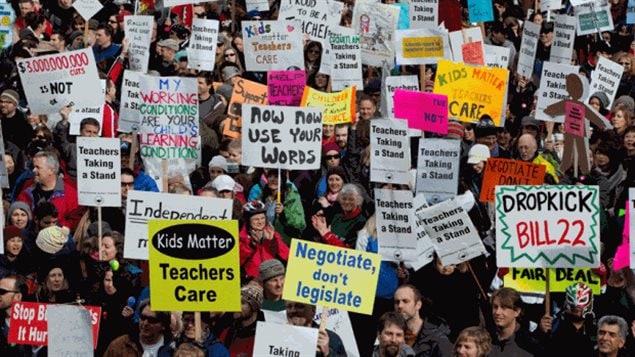“Union representation dramatically affects workers’ ability to move up the middle class ladder,” says a report by the left-leaning think tank, the Canadian Centre for Policy Alternatives (CCPA). The report used government statistics from the last 25 years to look at full time workers and the links between union representation and income levels.
“What we found was that there was a very definite difference, that union-represented employees tended overwhelmingly to be located in the middle to upper-middle income range,” says Hugh Mackenzie, an economist with the CCPA.
ListenUnionization and income levels linked
Unions are in decline in the private sector in Canada and these statistics revealed that the number of unionized workers who received middle to upper level incomes was cut in half since 1997. “So there had been a dramatic reduction in well-paid union-represented jobs in the private sector,” notes Mackenzie.
Looking at five-year periods, the statistics indicate that those who were not unionized at the beginning and then got a union job were more likely to be vaulted into the middle class. Those who lost a unionized job, “essentially got kicked out of the middle class.”
Mackenzie concludes that “declining union representation is an important contributor to the squeeze on middle income earnings and it’s an important contributor to this growing gap that we’re seeing between people at the top of the income distribution and everybody else.”

Labour laws must change, says economist
Canadians, he says, have a tendency to think there is nothing they can do about growing income inequality, but “I think what the data suggest is that’s just not true. There are some important structural things that are going on in the economy that are contributing to growing income inequality and those are things that we can do something about.”
Mackenzie says there need to be changes to Canada’s Labour Standard Regulations and the rules governing labour-management relations. As an example he notes companies increasingly hire contractors to do work for them so there is no direct relationship between a company and workers. He suggests rules be changed so that companies cannot evade their legal obligations to workers by putting a contractor between them.
As more Canadians take part time jobs, he says the rules need to change to ensure they are protected by labour standards and that they have a right to be unionized.







For reasons beyond our control, and for an undetermined period of time, our comment section is now closed. However, our social networks remain open to your contributions.